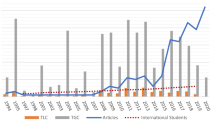Abstract
This article explores the issues of cultural transmission and discontinuity, as well as the implications of culturally based assumptions and attitudes and their potential influence in schools. Through interviews based upon questions specifically related to literacy and literacy acquisition conducted with five seventh-grade students and one eighth-grade student who were perceived to have achieved various levels of success or failure in school-related tasks, insights about student learning and adaptation strategies are revealed which may have pedagogical implications for educators. Arguments are made that adjustments in culturally based assumptions and attitudes by members of the community and the school may influence the academic success or failure of our children.
Similar content being viewed by others
REFERENCES
Au, K. H. (1980). Participation structures in a reading lesson with Hawaiian children: Analysis of a culturally appropriate instructional event. Anthropology and Education Quarterly 11(2): 91–115.
Bourdieu, P., and Passeron, J. C. (1977). Reproduction: In Education, Society, and Culture. Beverly Hills, CA: Sage.
Cummins, J. (1986). Empowering minority students: A framework for intervention. Harvard Educational Review, 56(1): 18–35.
Delpit, L. D. (1988). The silenced dialogue: Power and pedagogy in educating other people' children. Harvard Educational Review 58(3): 280–298.
Erickson, F. (1984). School literacy, reasoning, and civility: An anthropologists perspective. Review of Educational Research 54(4): 525–544.
Erickson, F. (1987). Transformation and school success: The politics and culture of educational achievement. Anthropology and Education Quarterly 18(4): 335–356.
Freire, P. (1988). Cultural Action for Freedom. Cambridge, MA: Harvard Educational Review.
Gibson, M. A. (1991). Ethnicity, gender and social class: The school adaptation patterns of West Indian youths. In M. Gibson and J. Ogbu, Minority Status and Schooling: A Comparative Study of Immigrant and Involuntary Minorities (pp. 169–203). New York: Garland.
Hart, C. W. M. (1997). Contrasts between prepubertal and postpubertal education. In G. D. Spindler (ed.), Education and Cultural Process: Anthropological Approaches (3rd ed.) (pp. 362–382). Prospect Heights, IL: Waveland Press.
Heath, S. B. (1994). Ways with Words: Language, Life, and Work in Communities and Classrooms. New York: Cambridge University Press.
Macionis, J. J. (1987). Sociology. Englewood Cliffs, NJ: Prentice-Hall.
Mahiri, J. (1994). Reading rites and sports: Motivation for adaptive literacy of young African-American males. In B. J. Moss (ed.), Literacy Across Communities (pp. 121–146). Cresskill, NJ: Hampton Press.
Merriam-Webster' Collegiate Dictionary. (10th ed.). (1993). Springfield, MA: Merriam-Webster.
Ogbu, J. (1981). Origins of human competence: A cultural-ecological perspective. Child Development 52, 413–429.
Ogbu, J. (1982). Cultural discontinuities and schooling. Anthropology and Education Quarterly, 13(4): 290–307.
Ogbu, J. (1991). Low school performance as an adaptation: The case of blacks in Stockton, California. In M. Gibson and J. Ogbu (eds.), Minority Status and Schooling: A Comparative Study of Immigrant and Involuntary Minorities (pp. 249–285). New York: Garland.
Ogbu, J. (1992). Understanding cultural diversity and learning. Educational Researcher, 21(8): 5–14.
Pettitt, G. (1946). Primitive education in North America. American Archeology and Ethnology 43(1), University of California Publications.
Rogers, C. (1983). Freedom to learn for the 80'. Columbus, OH: Charles E. Merrill.
Spindler, G. D. (1997). The transmission of culture. In G. D. Spindler (ed.), Education and Cultural Process: Anthropological Approaches (3rd ed.) (pp. 275–309). Prospect Heights, IL: Waveland Press.
Trueba, H. T. (1990). Mainstream and minority cultures: A Chicano perspective. In G. and L. Spindler, The American Cultural Dialogue and Its Transmission (pp. 122–143). Bristol, PA: Falmer Press.
Trueba, H. T. (1998). Challenges in the education of Mexican immigrant children: Adaptive strategies of families in a binational world. In M. M. Suarez-Orozco (ed.), Crossings: Mexican Immigration in Interdisciplinary Perspectives (pp. 249–277). Cambridge: Harvard University Press and the D. Rockefeller Center for Latin American Studies.
Varenne, H., Goldman, S., and McDermott, R. P. (1997). Racing in place: Middle class work in success/failure. In G. D. Spindler (ed.), Education and Cultural Process: Anthropological Approaches (3rd ed.) (pp. 136–157). Prospect Heights, IL: Waveland Press.
Author information
Authors and Affiliations
Rights and permissions
About this article
Cite this article
Van Horn, L. Self-Determination and Cultural Empowerment: Reader Histories Reveal Learning and Adaptation Strategies. The Urban Review 32, 177–195 (2000). https://doi.org/10.1023/A:1005185832607
Issue Date:
DOI: https://doi.org/10.1023/A:1005185832607




